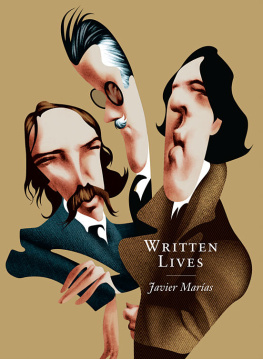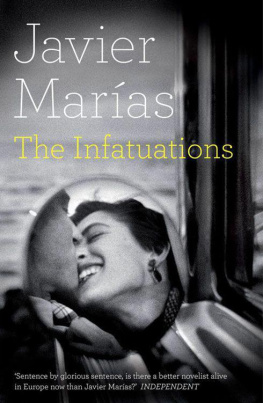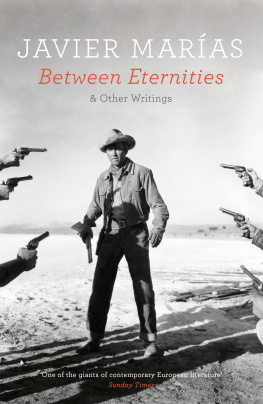
Javier Maras
Your Face Tomorrow 1: Fever and Spear
The first book in the Your Face Tomorrow series, 2005
Translated From The Spanish By Margaret Jull Costa
For Carmen Lopez M, who will, I hope, want to go on listening to me
And for Sir Peter Russell,
to whom this book is indebted
for his long shadow,
and the author,
for his far-reaching friendship
The translator would like to thank Javier Maras, Annella McDermott, Palmira Sullivan, Antonio Martin and Ben Sherriff for all their help and advice.
One should never tell anyone anything or give information or pass on stories or make people remember beings who have never existed or trodden the earth or traversed the world, or who, having done so, are now almost safe in uncertain, one-eyed oblivion. Telling is almost always done as a gift, even when the story contains and injects some poison, it is also a bond, a granting of trust, and rare is the trust or confidence that is not sooner or later betrayed, rare is the close bond that does not grow twisted or knotted and, in the end, become so tangled that a razor or knife is needed to cut it. How many of my confidences remain intact, of all those I have offered up, I, who have always laid such store by my own instinct and yet have still sometimes failed to listen to it, I, who have been ingenuous for far too long? (Less so now, less, but these things are very slow to fade.) The confidences I shared with two friends remain preserved and intact, unlike those granted to another ten who lost or destroyed them; the meagre confidences shared with my father, and the chaste ones vouchsafed to my mother, which were very similar, if not the same, although those granted to her did not last very long, and she can no longer break them or, at least, only posthumously, if, one day, I were to make some unfortunate discovery, and something that was hidden ceased to be hidden; gone are the confidences given to sister, girlfriend, lover or wife, past, present or imaginary (the sister is usually the first wife, the child wife), for in such relationships it seems almost obligatory that one should, in the end, use what one knows or has seen against the beloved or the spouse or the person who turns out to have been only momentary warmth and flesh against whoever it was who proffered revelations and allowed a witness to their weaknesses and sorrows and was ready to confide, or against the person who absent-mindedly reminisced out loud on the pillow not even aware of the dangers, of the arbitrary eye always watching or the selective, biased ear always listening (often it's nothing very serious, for domestic use only, when cornered or on the defensive, to prove a point if caught in a tight dialectical spot during a prolonged discussion, then it has a purely argumentative application).
The violation of a confidence is also this: not just being indiscreet and thereby causing harm or ruin, not just resorting to that illicit weapon when the wind changes and the tide turns on the person who did the telling and the revealing and who now regrets having done so and denies it and grows confused and sombre, wishing he could wipe the slate clean, and who now says nothing it is also profiting from the knowledge obtained through another's weakness or carelessness or generosity, and not respecting or remembering the route by which we came to know the information that we are now manipulating or twisting sometimes it's enough just to say something out loud for the air to grasp and distort it: be it the confession of a night of love or of one desperate day, or of a guilty evening or a desolate awakening, or the drunken loquacity of an insomniac: a night or a day when the person talking talked as if there were no future beyond that night or that day and as if their loose tongue would die with them, not knowing that there is always more to come, that there is always a little more, one minute, the spear, one second, fever, another second, sleep and dreams spear, fever, my pain, words, sleep and dreams and then, of course, there is interminable time that does not even pause or slow its pace after our final end, but continues to make additions and to speak, to murmur, to ask questions and to tell tales, even though we can no longer hear and have fallen silent. To fall silent, yes, silent, is the great ambition that no one achieves not even after death, and I least of all, for I have often told tales and even written reports, more than that, I look and I listen, although now I almost never ask questions. No, I should not tell or hear anything, because I will never be able to prevent it from being repeated or used against me, to ruin me or worse still from being repeated and used against those I love, to condemn them.
And then there is distrust, of which there has been no shortage in my life either.
It's interesting how the law takes this into account and, even odder, takes the trouble to warn us: when someone is arrested, at least in films, he is allowed to remain silent, because, as he is immediately informed, 'anything you say can be used against you'. There is in this warning a strange or indecisive and contradictory desire not to play entirely dirty. That is, the prisoner is told that the rules will, from now on, be dirty, he is informed and reminded that, somehow or other, they are going to catch him out and will make the most of any blunders, lapses and mistakes he might make he is no longer a suspect, but an accused man whose guilt they are going to try to prove, whose alibis they will try to destroy, he has no right to impartiality, not between now and the day he appears in court all their efforts will be channelled into gathering the evidence that will condemn him, all their vigilance and monitoring and investigation and research into collecting the clues that will incriminate him and support their decision to arrest him. And yet they offer him the opportunity to remain silent, indeed, almost urge it upon him; they tell him about this right which he may have known nothing about, and therefore, sometimes, actually put the idea in his head: not to open his mouth, not even to deny what he is being accused of, not to run the risk of having to defend himself alone; remaining silent appears or is presented as being clearly the most sensible option, one that could save us even if we know ourselves to be and are guilty, as the only way in which this self-declared dirty game can be rendered ineffectual or barely practicable, or at least not with the involuntary and ingenuous collaboration of the prisoner: 'You have the right to remain silent'; in America, they call it the Miranda law and I'm not even sure if its equivalent exists in our countries, they used it on me once, a long time ago, well, not that long ago, but the policeman got it wrong, left out a bit, he forgot to say 'in court' when he rattled off the famous phrase, 'anything you say can be used against you', there were witnesses to this omission and the arrest was invalidated. The same strange spirit imbues that other right of the accused, not to testify against himself, not to prejudice himself verbally with his story or his answers, with his contradictions or stumblings. Not to harm himself by his own narrative (which can, indeed, cause great harm), in other words, to lie.
The game is, in fact, so dirty and so biased that, on such a basis, no justice system can possibly presume to be just, and perhaps, therefore, there is no possible justice, ever, anywhere, perhaps justice is a phantasmagoria, a false concept. Because what the accused is told boils down to this: 'If you say something that suits us and is favourable to our aims, we will believe you and take it on board and use it against you. If, on the other hand, you allege something to your advantage or in your defence, something that proves exculpatory for you and inconvenient for us, we won't believe you at all, they will be like words in the wind, given that you have the right to lie and that we simply assume that everyone that is, all criminals will avail themselves of that right. If you let slip an incriminating statement or fall into a flagrant contradiction or openly confess, those words will carry weight and will be used against you: we will have heard them, recorded them, noted them down, taken them as said, there will be written evidence of them, we will add them to the report, and they will be used against you. Any phrase, however, that might help to exonerate you will be considered frivolous" and will be rejected, we will turn a deaf ear, ignore it, discount it, it will be so much air, smoke, vapour, and will not work in your favour at all. If you declare yourself guilty, we will judge it to be true and take your declaration very seriously indeed; if innocent, we will take it as a joke, and, as such, undeserving of serious consideration.' It is thus taken for granted that both the innocent and the guilty will proclaim themselves to be the former, and so, if they speak, there will be no difference between them, they will be made equal, on a level. And it is then that these words are spoken: 'You have the right to remain silent', although this won't help to distinguish between the innocent and the guilty either. (To remain silent, yes, silent, the great ambition that no one achieves not even after death, and yet, at critical moments, we are advised and urged to do just that: 'Keep quiet and don't say a word, not even to save yourself. Put your tongue away, hide it, swallow it even if it chokes you, pretend the cat has got it. Keep quiet, then save yourself.')
Next page








